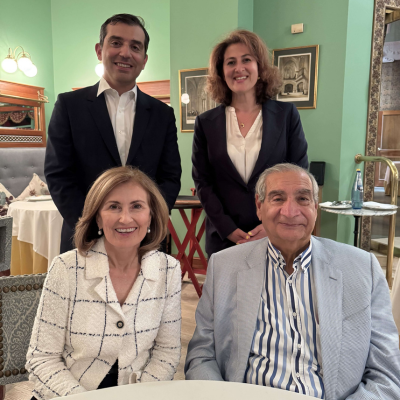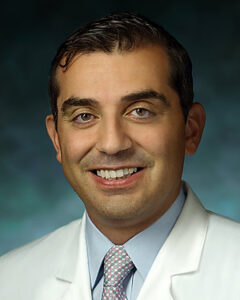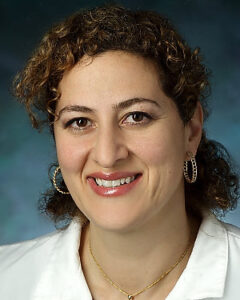Johns Hopkins UniversityEst. 1876
America’s First Research University
When Armeane Choksi was diagnosed with kidney cancer in 2013, the uncertainty was daunting. At the time, there was no reliable way to biopsy the kidney, so the entire organ had to be removed. Several years later, the Choksis faced a second diagnosis when Mary was found to have a different form of cancer affecting the kidney — a distinct urologic malignancy known as upper tract urothelial carcinoma (UTUC). While kidney cancer primarily originates within the kidney tissue, UTUC arises from the urothelium, or the lining of the urinary tract. Thanks to recent advances, her treatment was far less invasive, and her care team was able to remove the tumor and deliver chemotherapy directly to the kidney.

What stood out most to the Choksis in both experiences wasn’t the complexity of the diagnoses. It was the thoughtful, compassionate care they received from Dr. Mohammad Allaf at the Johns Hopkins Brady Urological Institute in East Baltimore and Dr. Armine Smith, a faculty member of the Brady at Sibley Memorial Hospital, a Johns Hopkins Hospital in Washington, D.C. The connection was personal. Mary is an alumna of the Johns Hopkins School of Advanced International Studies, and the couple lives in D.C.
Inspired by their experiences and their long-standing support of education and research, the Choksis made a gift that reflects those values. Half will support kidney cancer research at Hopkins, and the other half will establish the Mary and Armeane Choksi Scholar.
Armeane, now a member of the Brady advisory board, recalls the confidence he felt in Dr. Allaf’s care.
“He answered my questions completely and totally,” he says, noting that kidney cancer receives far less research attention than prostate cancer. “I’m not a medical man, but I trust his judgment. We want to help push the frontiers of research forward, and that’s exactly what he’s doing.”
Over the years, the Choksis have stayed in touch with Dr. Allaf as their care evolved into a shared commitment to progress. Now director of the Department of Urology at Johns Hopkins, Dr. Allaf says their gift will help drive high-risk, high-reward projects — the kind that often struggle to secure early funding but can lead to transformative breakthroughs.

“It allows us to support young investigators just getting started. And when those ideas gain traction, they attract more funding from other philanthropists or agencies like the National Institutes of Health (NIH),” Dr. Allaf explains. “The timing couldn’t be better given the severe shortage of funding for these diseases.”
The Choksi Scholar, the other half of the couple’s gift, reflects the emphasis on educating a new generation of research leaders. Dr. Allaf notes that philanthropy, including scholar funds and endowed professorships, are essential to academic medicine, giving faculty the freedom to pursue bold, innovative research.
The role also holds special meaning for the Choksis, combining their support for education, research, and their community. Dr. Armine Smith, who treated Mary at Sibley, now serves as the inaugural Choksi Scholar, advancing regional collaboration and urologic cancer research.
“Again, we were drawn to that rare combination of skilled, compassionate practitioners who haven’t left the science behind,” Mary says. “It creates an interaction where the physician explains things clearly and thoughtfully, like you’re a thinking human being.”
As the Choksi Scholar, Dr. Smith is focused on improving outcomes for patients with bladder and upper tract urothelial cancers, especially women, who form the minority of people diagnosed with this cancer. She says she has two main goals: to advance the often-overlooked science of urothelial cancers — including both bladder cancer and UTUC — and to develop safer, less invasive treatments that preserve organ function and enhance quality of life.

Her research spans the continuum of care, from identifying early risk factors and improving detection to developing new treatment protocols and studying survivorship. She has a special focus on women with bladder cancer and how treatments affect quality of life, sexual function, and emotional well-being.
Dr. Smith also collaborates with colleagues at the NIH and across Hopkins to explore emerging areas like the microbiome’s role in cancer treatment and response to immunotherapy. Her team is doing cutting-edge research that’s advancing the field, not just at Hopkins but through collaboration with other institutions. That work depends on early philanthropic support.
“Research is expensive, and people are essential — from collecting data to working with patients,” Dr. Smith, who is also director of Johns Hopkins Urologic Oncology at Sibley, says. “This kind of funding helps us explore promising ideas, generate early findings, and apply for major grants.”
For the Choksis, knowing that their support helps make this kind of progress possible adds an extra layer of meaning. Supporting Hopkins in East Baltimore and Sibley in their own community feels especially personal. In many ways, they say, it’s their neighborhood hospital. But at its core, their gift is a way to say thank you.
“We’re both grateful for being treated very well and successfully,” Armeane says. “It’s nice to express that gratitude by supporting someone who is a high-level professional. And the very nice thing is you feel that gratitude returned.”
Topics: Friends of Johns Hopkins Medicine, Johns Hopkins Medicine, Sibley Memorial Hospital, The Brady Urological Institute, Fuel Discovery, Promote and Protect Health